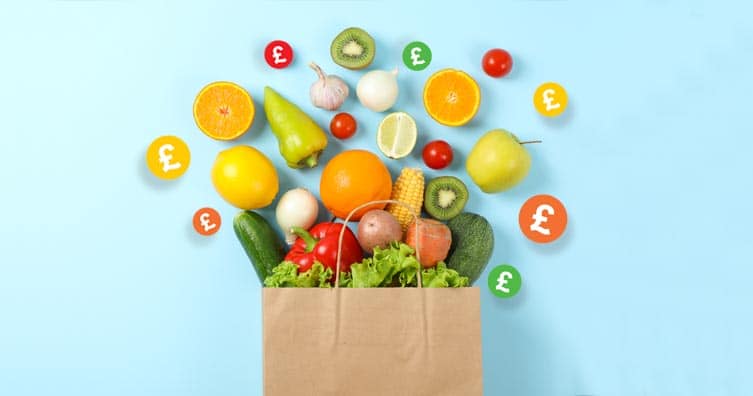54 ways to save money on food
Feel like you're (literally) eating up your Student Loan? Bet you won't have thought of these tips for saving money on food and groceries...

Credit: AtlasStudio, Blan-k – Shutterstock
When you start shopping for your own food at uni, one of the biggest shocks is just how expensive it can be – especially cheese.
In our latest National Student Money Survey, students in the survey spent an average of £144 a month on groceries alone – that's more cash than they spend on anything else apart from rent!
When it comes to food shopping, students tend to fall into the same pitfalls over and over again. How often have you bought a one-off meal from the Tesco Express around the corner instead of stocking up at a big-budget supermarket?
It's time to break those old habits and look at this shiny array of top tips and hidden gems to save yourself some cash.
How to save money on food and groceries
Here are the best ways to save money on food:
- Become a mystery diner and you'll get your meals out in restaurants free of charge.
- Brew your own beer at home for less than a pound a pint.
- Get cashback on your shopping using the best supermarket cashback apps.
- Sign up for freebies – and luckily, we have the ultimate list of freebies for you.
- Find out if you have a 'pay as you feel' supermarket or similar initiative near where you live.
- Follow all your favourite food brands, cafes and restaurants on social media so you're first to hear about freebies and competitions.
- Downshift to value brands – a lot of your basic foods can be bought from the value range, and you genuinely won't be able to tell the difference. Use our guide on downgrading your supermarket brands to find out more.
- Grow your own food at home – no garden necessary.
- Shop at wholesalers like Costco with your housemates and share the cost.
- Look for yellow stickers in the reduced section. Many supermarkets sell food that's getting close to its sell-by date at a cheaper price.
- Freeze everything that's freezable – making use of your freezer will save you a shed load in the long run. The trick is to freeze things in portions and know what's freezable and what's not.
- Take advantage of new customer discounts with online grocery delivery services and same-day food apps.
- Shop online at Approved Foods, which sells food close to/past its best-before date for discounted prices.
- Get a part-time job in a cafe or restaurant that feeds staff meals during breaks (and lets you take leftovers home).
- Plan your meals for the week, shop accordingly and use the freezer when necessary.
- Write a shopping list before going to the supermarket – and try not to deviate from it.
- Also, do a stock take before going to the supermarket, and let this dictate your shop/meals for the week.
- Set a weekly budget, and stick to it.
- Buy meat in bigger cuts and make it last. For example, buy a whole chicken and use the breasts and thighs for a few dinners, use the extras for your lunch sandwiches, then boil up what's left and use it as stock for soups.
- Buy tinned food when you can as this lasts a very long time.
- Don't fall for the tricks supermarkets pull to encourage you to spend more money.
- Avoid waste by knowing which foods you can eat after their best-before dates and using our tips to make food taste fresh again.
- Use budget supermarkets like Aldi and Lidl.
- While at Lidl, ask about their 'Too Good To Waste' boxes. You can get around 5kg of fruit and veg for £1.50.
- Improve your frugal student food game by making one of these fancy dinner recipes with baked beans.
- If you're shopping at food markets, make sure you know how to haggle like a pro. Also, try to go close to the market's closing time as that's usually the best time for low prices.
- Learn to cook. Learning some decent budget recipes will save you money if you can ditch overpriced supermarket meals for one. Our student cooking tips will get you started.
- Avoid paying full price for premium takeaway food with our tips.
- Shop at the right time of day. Different supermarkets tend to reduce items at certain points of the day.
- Make sure you're using storage tricks to make food last. Your food could last weeks (or even months!) longer than expected.
- Become a reducetarian! Reduce your intake of meat to save on cash and reduce your carbon footprint.
- Eat out on your birthday. Loads of places will give you a free meal to celebrate. Hope you're hungry!
- Regrow food from roots and scraps. Celery, avocado and lettuce are just a few that will regrow if you look after them right.
- Make sure you know your consumer rights when it comes to buying consumables and return any substandard food.
- Try keeping to a tighter food budget than usual for a week to see if you can maintain a balanced diet for less.
- Invest in decent food containers so you can take lunches into uni – and never buy lunch on campus.
- Max out on all-you-can-eat buffets. You can't take home a doggy bag, but you can certainly get your money's worth.
- Use coupons. Look out for coupons that can be cut out from newspapers and magazines and used for money off food shops, and check couponing sites for codes that can be used online.
- Buy in bulk (but only when it makes sense) – particularly with your toilet paper. However, don't overbuy food. It's best to only buy what you know you will use to avoid anything going to waste.
- Try wombling at supermarkets – using discarded receipts to save money and score loyalty points.
- Think seasonally when you shop. When certain foods are in season, they should be cheaper. If you end up with too much of one type of food as a result, freeze it until you need it.
- Never go to the supermarket when you're hungry.
- Take turns cooking with your housemates – just make sure you take turns washing up too.
- Buy frozen fruit and veg instead of fresh – you won't believe how much cheaper frozen can be. This works for meat and fish, too, with frozen cod going perfectly in our cod and pesto dish.
- Don't be embarrassed to ask for a doggy bag at a restaurant. That's tomorrow night's dinner right there.
- Look for deals! Simple but effective. Sign up for our deals roundup newsletter or follow our Facebook page for daily deals.
- Check out the 'world' sections of the supermarket – sometimes the prices of basics like rice can be cheaper.
- Have frugal days to counteract days when you eat out or spend money going out drinking.
- Chip in for basics and bulk buys with your housemates.
- Host 'bring a plate' parties and eat the leftovers later in the week.
- Invest in a slow cooker. Even the cheapest of meats taste amazing when they've been cooked for 12 hours (or, in the case of our pulled pork recipe, around six hours).
- Never pay for plastic bags. Not only is it a waste of 10p, but they're bad for the environment too. If you already have lots of plastic bags at home, you may be able to recycle them for money.
- Use loyalty cards for money off and freebies. See our list of the best loyalty cards currently out there.
- Recreate your favourite restaurant meals at home instead of going out by trying some cheap fakeaway recipes.
Before you go, check out episode two of our podcast, No More Beans. We discuss even more ways to save money on food, including how to eat out for free.
And what about ways to save money on accommodation? We've got some tips to save money on rent.








